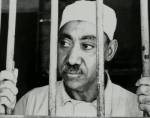 Here’s some serious background reading to recommend.
Here’s some serious background reading to recommend.
Shortly after it came out, I read the book The Looming Tower: Al-Qaeda and the Road to 9/11 by Lawrence Wright. He won the Pulitzer Prize for this book (for General Nonfiction – 2007).

As the Egypt situation unfolds, this might be a good book to put in your reading stack. We hear a lot about the Muslim Brotherhood. Here is a little background from the book about Egypt and the Muslim Brotherhood (there is much more in the book).
The year was 1949. Sayyid Qutb, (who later had an enormous influence on Osama bin Laden), was in Washington D.C. studying English. He had his tonsils removed at the George Washington University hospital, where he has deeply offended by the conversations, and the “look,” of an American nurse.
“News came of the assassination of Hasan al-Banna, the Supreme Guide for the Society of the Muslim Brothers, on February 12, in Cairo. “Today, the enemy of Christianity in the East was killed,” he says the doctors told him. “Today, Hasan al-Banna was murdered…”
Banna’s voice was stilled just as Qutb’s book Social Justice in Islam was being published – the book that would make his reputation as an important Islamic thinker…
Shortly after, Qutb was offered a fee of ten thousand dollars for the rights to translate his new book into English, “a fantastic sum for such an obscure book.” Qutb refused. He later speculated that James Heyworth-Dunne (the man who offered the fee) was attempting to recruit him to the CIA. “I decided to enter the Brotherhood even before I left the house.”
The book is filled with insight into the thinking of the Muslim Brotherhood (“It is the nature of Islam to dominate, not to be dominated, to impose its law in all nations, and to extend its power to the entire planet,” wrote Hasan al-Banna).

And the book is filled with details about the treatment of its followers in Egyptian prisons.
In 1955, some of the imprisoned Brothers staged a strike and refused to leave their cells. They were gunned down. Twenty-three members were killed and forty-six injured. Qutb was in the prison hospital when the wounded men were brought in. Shaken and terrified, Qutb wondered how fellow Muslims could treat each other in such a way.
In this week of protest erupting into violence in Egypt, it might help to read some background. As Lawrence Wright captured, everything is connected, and goes back quite a ways.
And, by the way, learning about Sayyid Qutb is a good/important addition to your learning plan.
• (for a quick read about Qutb, read this article from American Public Media. Scroll down into the article).
